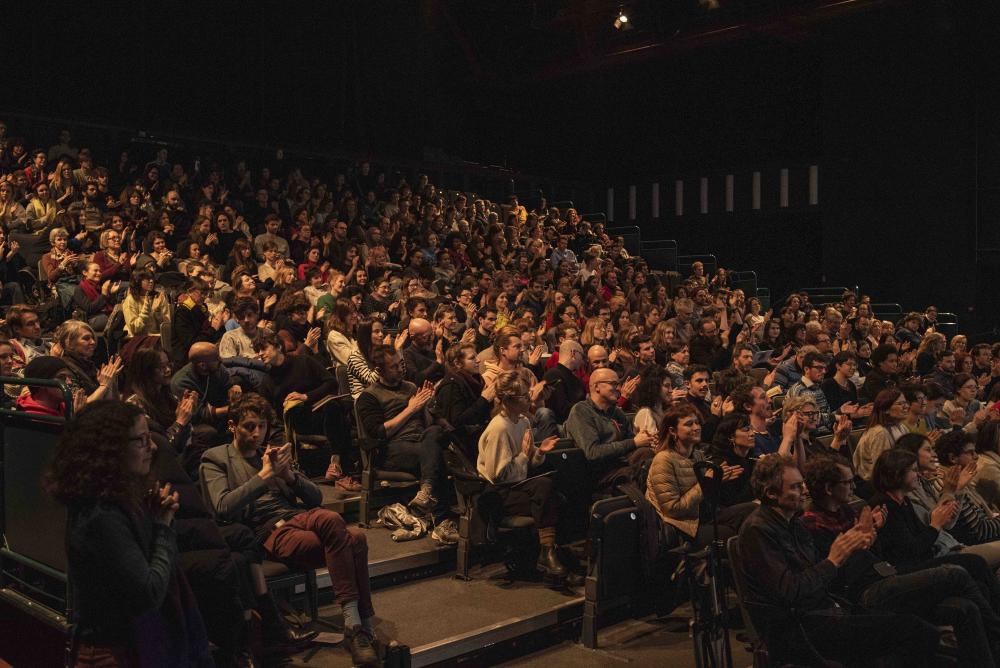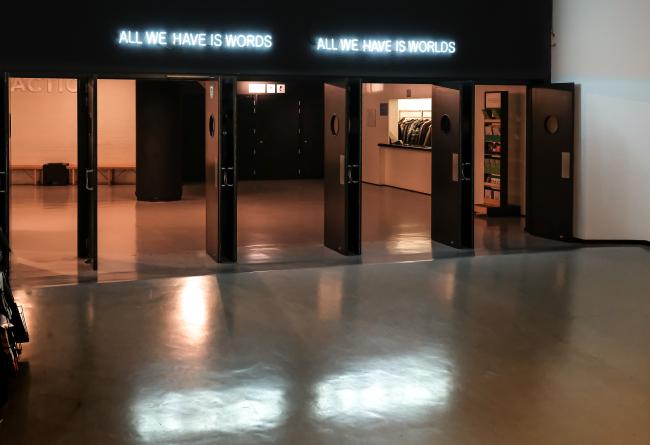PAY WHAT YOU CAN: from experiment to policy
Last year, as part of our long-term project How to Be Many?, Kaaitheater launched a 'Pay What You Can' experiment in ticket sales.
From the 2022-2023 season, this is no longer an experiment but policy.
In order to evaluate the experiment, we needed information. That is why we linked an online mini survey to each ticket purchase (total of 9,753 purchases between September 2021 and the end of April 2022). We asked about age, how often people visited Kaaitheater, how they liked the 'Pay What You Can' system and so on. In addition, there was room for a message for us, which of you took did. We have read these messages with great interest, many thanks!
"I think it's a fantastic experiment and I'm curious how it will evolve!
Well, we are happy to share our findings here after that year of experimentation.
6 reasons for continuing
- Solidarity in practice.
This 'Pay What You Can' system will make theatre visits more accessible for a significant group of people. Not only did this enable 22% of respondentsto come to Kaaitheater more often, it also persuaded 19% to buy a ticket.
It makes me feel like Kaai really acknowledges that we live in an unequal society and is trying to make art available to the many. I could afford to go to the theatre once a week at this price while before it would be once a month.”
“I think it's fine as long as the theatre has enough money to operate.”
"If it works, I don't mind paying a bit more so that those with less means can pay less, but does it work?"
- Ticket revenue remains stable.
We manage to achieve the predefined average revenue per paying seat. In particular as there are plenty of people who do not choose the lowest price categories, but pay the suggested price or even more. The public reaction also told us that:"An incentive to pay more.""Great and generous idea. And I paid full." In other words, it works and that is not the least because we now offer fewer free tickets, and we have no season tickets or other discounts.
- Great interest from colleagues at home and abroad.
Many are curious about the experiment and are considering introducing the system (in part). Thanks to the surveys and our own data, we can share the results with the professional field. Meanwhile, many are following our example.
"Fantastic idea! I would like to see this in other culture houses as well."
- Many young and new audiences.
25% of respondents have never been before and since December, 11% are visit for the second time. We that we gradually attract a new audience.45% of the respondents are under 35. We attribute this trend to an interaction between pricing policy and the offer itself: we invite organisations that create their own programmes, and we ourselves set new accents in programming.
- Encouragement by the public.
From the countless short and powerful signals such as "Excellent!", "The Future!", "Superb!", "Top", and "THANK YOU",to compliments such as "Bold. A system of trust that is truly valued." To "Very good, inclusive for all, and, in a way, empowering."
- Winning the Most Audacious Project Award from Visit.Brussels
This Award confirms that, in addition to the many votes received from the public, a professional jury with members from the tourism sector, academia and the press not only finds the project daring, but also grants it a sustainable future.
Good news: we will continue to use this system in cooperation with the many partners.
We now have for some time been offering a large part of our programme at partner houses in Brussels and the Flemish periphery and we have sat down with each of them to see how we could continue our pricing policy for a certain quota of places. Thanks to the openness and trust of each of the partners, we are able to continue the PWYC policy everywhere. Thank you for that!
Three things we will do differently
"Very annoying having to fill in this survey with every purchase."
We are getting rid of the mandatory survey, but there will still be room to respond to our ticketing policy. We thank everyone for filling it out over the past year; it has taught us a lot and helped us to defend the policy.
"It would be interesting to know what the results are!
We will continue to share the results and insights about 'Pay What You Can' with the public, especially on the website.
"It's nice, but also quite compelling and somewhat plays on a latent sense of guilt (though I'm not sure that's such a bad thing)."
This feedback has led to minor adjustments in our explanatory statement. We want to be as specific as possible as to why we are doing this and without stigmatising people. But we cannot avoid the fact that the system involves self-reflection. Or as this visitor writes:
"It makes me think about money completely differently."
Three recurring remarks that deserve an answer
"I would like to take out a subscription again."
"I found the former system with subscriptions better and certainly democratic."
There are many advantages to subscriptions, both for Kaaitheater (early sales of larger numbers of tickets), and for the visitor (planning and commitment in advance, nice discounts). However, these discounts are only interesting for the frequent visitor. This is why Kaaitheater wants to offer every single ticket according to a PWYC rate, in order to give every potential visitor the chance to buy a ticket according to his or her capacity.
"I love it! But I always have the tendency to pay less than I should, so it might not be the most beneficial ;-)"
"It is very difficult to estimate what is a fair price".
Firstly, the different price categories we use are linked to the cost of the show. A large auditorium performance, with a lot of technique or performers, is usually more expensive than a small performance. This is reflected in the options and the suggested price. Secondly, your choice of price is not a reflection of your appreciation of the performance, but is linked to how much you - regardless of your age - can pay for a performance of a certain category (large hall, international, small hall, lecture, etc.). Thirdly, there is a simple trick to avoid worrying: the suggestion price! Comments like "A suggested price is a useful price indicator." and "Glad there is a suggested price" show this.
"For some people, 10 euro is already a lot.” Apart from the PWYC options, lower rates are available through Arsène50, Paspartoe, etc. Information can be found on the website. You cannot buy these tickets online, but you can reserve them by telephone or e-mail.
"Still having reduced price for students or unemployed people" 10 euro was the lowest student rate before we implemented the PWYC system. Thanks to PWYC, non-students can also enjoy this rate.
"I find the online prices too high." Online programmes also have a cost (remuneration for speakers, curators, artistic contributions). Recording and organising a streaming session involves additional costs. Among other things, we ensure that the image quality is high. That is why we also link paying tickets to the online programme. The payment options are lower than for performances.

